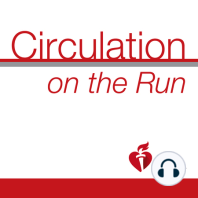20 min listen
Circulation July 7, 2020 Issue
ratings:
Length:
24 minutes
Released:
Jul 6, 2020
Format:
Podcast episode
Description
Dr Carolyn Lam: Well, the Circulation on the Run, your weekly podcast summary and backstage pass to the journal and its editors. I'm Dr Carolyn Lam, associate editor from the National Heart Centre and Duke National University of Singapore. Dr Greg Hundley: And I'm Dr Greg Hundley, associate editor from the Pauley Heart Center at VCU Health in Richmond, Virginia. Well, Carolyn, this week's feature involves the Compass trial, and we'll be talking about a comparison of low-dose rivaroxaban plus aspirin compared to aspirin alone in patients with chronic vascular disease. But before we get to that, how about if we break away and discuss a few other papers. And I'll go first this time, because this week we're going to introduce another new feature in addition to Carolyn's Quiz. Dr Carolyn Lam: Wait a minute. This was not on the script. What's going on, Greg? Dr Greg Hundley: It's on the script! Carolyn, let me get to my first paper. It's from Professor Junling Liu from Shanghai Jiao Tong University School of Medicine, and it involves branched-chain amino acid catabolism and how that may promote thrombosis risk by enhancing tropomodulin-3 propionylation in platelets. But first, we've got a new feature to add to Carolyn's Quiz. It's called Way or No Way. Dr Carolyn Lam: Just so everybody knows. This was a one-way decision to add this new component of Carolyn's Quiz, but okay, I'm all for it. Go, Greg! Dr Greg Hundley: Okay. All right. It's a fast, quick question where our listeners seek your guidance regarding an important scientific discovery from one of our published manuscripts. Are you ready? Dr Carolyn Lam: No. Dr Greg Hundley: Okay. Here's your question. Do branched-chain amino acids promote arterial thrombosis. Way or no way? Dr Carolyn Lam: Maybe? Dr Greg Hundley: Okay, Carolyn. Dr Carolyn Lam: I have a feeling you're going to tell us yes, although I wouldn't have guessed that straight away. Dr Greg Hundley: Okay. Remember that branched-chain amino acids are essential nutrients, including leucine, isoleucine, and valine, and they serve as a resource for energy production and the regulator of important nutrient and metabolic signals. In this study, the activity of human platelets from healthy subjects before and after ingestion of branched-chain amino acids were measured. PP2Cm-deficient mice were used to elucidate the impacts of BCAA catabolism on platelet activation and thrombus formation. Dr Carolyn Lam: Now okay, okay. So what did they find? Way or no way? Dr Greg Hundley: Ingestion of branched-chain amino acids significantly enhanced the activity of platelets in response to agonists and increased the risk of arterial thrombosis. The branched-chain amino acid catabolic pathway-driven propionylation of tropomodulin-3 at K255 was found to be an important mechanism underlying the branched-chain amino acid-facilitated platelet activation, and elevated levels of branched-chain amino acids and enhanced expression of positive regulators of branched-chain amino acid catabolism in platelets were found probably responsible for the high platelet activity in type 2 diabetes mellitus. Dr Carolyn Lam: Very interesting. So yes, it is possible. And what is the clinical implications? Dr Greg Hundley: Right, Carolyn. Branched-chain amino acids, or their catabolites, enhance the risk of arterial thrombosis in small animals, and perhaps future human subject studies, that restrict branched-chain amino acid intake or target branched-chain amino acid catabolism may serve as a novel strategy for anti-thrombosis therapy. Dr Carolyn Lam: Interesting. Okay, Greg. Here you go. Question for me. Have you heard of Home Time? Dr Greg Hundley: Home Time? Yes. Home Time. It's not like time out for our kids, but we've been having a lot of Home Time in this COVID-19 with our families. Dr Carolyn Lam: All right. Touché. Touché. Home Time! Did you know it is a patient-centered outcome measure that accounts for rehospitalization mortality and post-discharge ca
Released:
Jul 6, 2020
Format:
Podcast episode
Titles in the series (100)
Circulation December 19/26, 2017 Issue: Circulation Weekly: Your Weekly Summary & Backstage Pass To The Journal by Circulation on the Run
